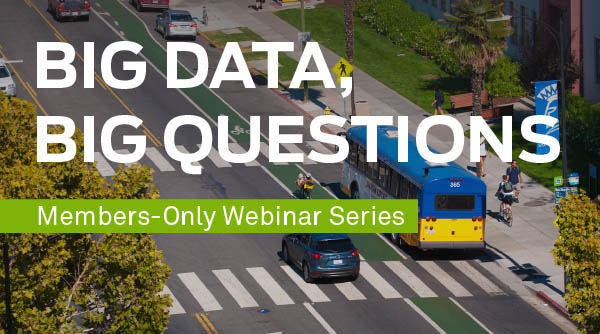
NACTO and the International Municipal Lawyers Association recently released Managing Mobility Data, a publication that outlines guiding principles for cities and companies developing data management policies. While the document was still in draft, NACTO hosted a cities-only webinar series to think through some of the major issues presented within it. Big Data, Big Questions invited public sector staff to participate in four sessions designed to raise their practical knowledge about mobility data and inform the development of the document, in order to help them and other practitioners better navigate this complex and fast-changing policy landscape.
The emergence of new technologies on city streets, from e-scooters to dockless bikes to ride-hail apps, have reshaped transportation, both physically and digitally. These devices and the companies that own them are generating unprecedented amounts of data on the public right-of-way. While this data is invaluable to cities’ understanding of their streets, acquiring, analyzing, and sharing it puts municipal transportation departments at the frontlines of emerging policy challenges.
Throughout nine presentations given by leading data experts, Big Data Big Questions explored these challenges and dove into topics that informed recommendations in Managing Mobility Data.
- Mobility Data Can Become Personally Identifiable Information (PII). Defined broadly, PII is any information that can directly or indirectly be linked with a particular individual or household. Even when mobility data is anonymized, with directly identifiable information stripped from the dataset, it can be used to re-identify people. In data-savvy hands, innocuous datasets can be traced back to specific individuals when combined with other resources, such as address look-up websites or social media pages. Because mobility data can be used in this way, it should be regarded as PII and treated carefully and in the same manner as existing practice for it.
- Transparency and Accountability Around Data Use Are Essential. As guardians of the public interest, cities face heightened scrutiny over their data practices. This attention comes at a moment when a number of high profile breaches of personal information from large companies like Yahoo! and Marriott are bringing issues of data security into the public eye. For cities seeking to apply privately-collected data for the public good, creating accountable data management practices that require them to detail what data they’re using for what purposes is paramount to protecting public trust and privacy.
- Cities Must Be Deliberate About the Data They Collect. For cities looking to make smart use of data, there is a tension between two competing forces: collecting enough data to use for as-of-yet undefined purposes and reducing potential liability over holding sensitive information. By defining a clear purpose for data requested, cities can reduce the chances of obtaining extraneous amounts of sensitive information, thereby limiting liability and data management burdens.
For their contributions to Big Data, Big Questions, and for taking cities on this critical tour through the world of mobility data, NACTO thanks Jan Whittington from the University of Washington, Greg Rodriguez from Best, Best, and Krieger, Jascha Franklin-Hodge, Joseph Jerome from the Center for Democracy and Technology, Michael Schnuerle from the City of Louisville, Bianca Wylie, Raphael Dumas from the City of Toronto, Sarah Gold from IF, and Kevin Webb from SharedStreets.